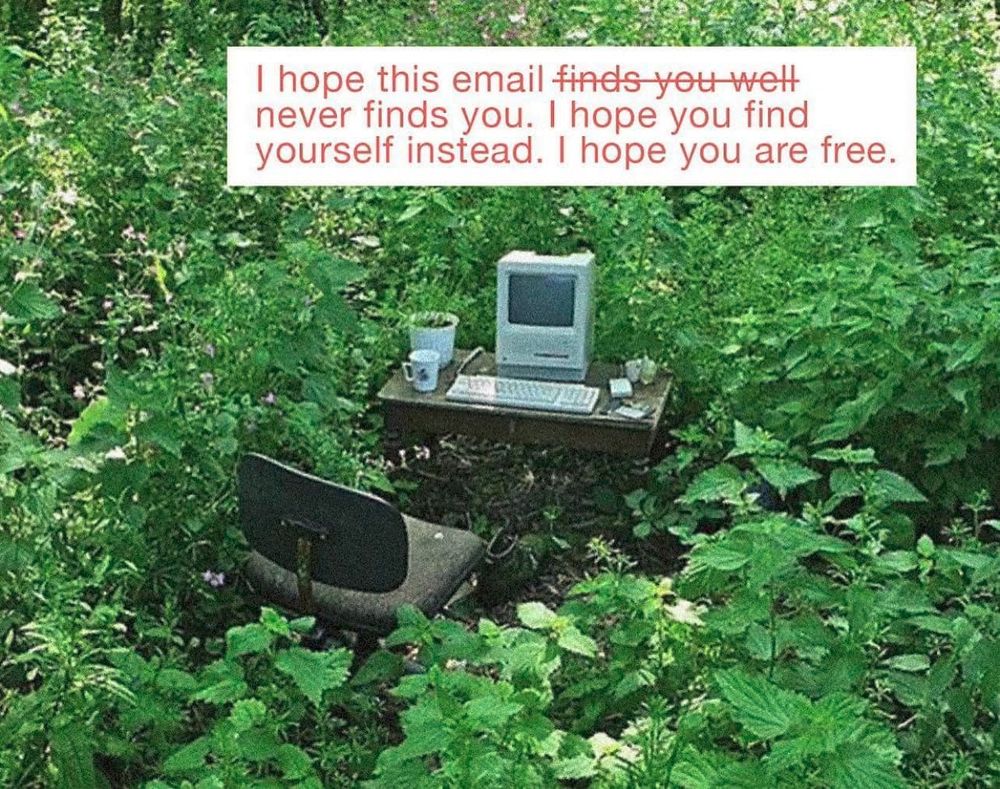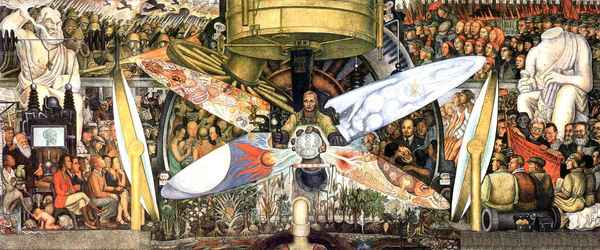Re: A weekly roundup
This post is migrated from the old Wordpress blog. Some things may be broken.

Hey, I’ll maybe do these once a week until I don’t. I haven’t quite figured out how to — or if I want to —attempt to monetise this site or if I’ve got anything anyone’s going to find worth paying for. Right now it’s just me doinking around and flicking the switches on and off to see what happens. Most of my action still happens on social sites more or less and those are also where I follow some interesting people who make me aware of neat things. So I may as well pass a few one. It’s not quite like my Now page, but I’m also not incredibly sure how it’s different. You tell me. Essentially, these are the tabs I’ve had open in my browser this week that were interesting enough to mention before closing them. Here are some of the better hits from my week of doomscrolling…
Tech Billionaires trying to create their own serfdoms
Company towns are nothing new. Chocolate maker Hershey tried one. Steinway, the piano maker, tried one in New York. My favourite that I one day want to visit is the long abandoned Fordlândia, in Brazil. So, it’s not surprising that tech billionaires want to dust off an old idea, give it new branding and make people believe they’re coming up with fresh new ideas on their own.
This article in TNR is mostly about a gaggle of Silicon Valley tycoons who want to buy up a bunch of agricultural land in Solano County, California, and turn it into a melange of the worst sci-fi dystopias you can think of from book or film. Beyond that, it covers a lot of other similar projects elsewhere, where they branding is all about building some data-driven paradise or something, but the goals are always the same: Avoid regulations or taxes, commodify citizenship, concentrate ownership and wealth. They remind me of the Saudi Prince MBS’ pretend city NEOM, a future gleeming metropolis where it’s likely going to be legal to dismember journalists.
Breaking into a password vault
Bitwarden is one of the best password management tools out there. It’s one of two I actively endorse when anyone asks for one. It’s open source, security audited, and is developed and maitnained with all the other good practies. That said, developing software with high security needs is very hard, and getting it wrong is serious. It’s important to note before going on that the issue was fixed in April last year. This week RedTeam Pentesting, the company that discovered a vulnerability (and responsibly disclosed it to the company) that let its researchers find a method to bypass credential checks to access an account, has published a tell-all blog post aobut it. It’s a good walk though and also illustrates that just finding a vulnerability isn’t enough. The hurdles to exploit it can still be significant. And it’s interesting to see how a lot of these systems work and the kinds of often-times submerged trade-offs developers make in order for tools to be mosre usable.
Palestine ‘zines to print-n-share
Print-Your-Own Palesine Zines is one of the better unique uses of Airtable I’ve seen. It’s an archive of 45 DIY publications various people and groups have made and release under Creative Commons licenses that anyone’s invited to print and distribute locally. ‘Zines are what we had before websites. They’re still a great way to distribute ideas, I think. They demand a different kind of attention than your mobile screen would. While the world used to be fairly full of them, the fact that they’re now more novel may be a drawing attraction. Print some and leave them around some area coffee shops or bus stops or other places people may be idle and bored.
An animated new year’s wish: The fall of the junta in Myanmar
The ways in which internet-connected cars spy on their drivers and enable abusers
In this installment of “the internet was a mistake” NYTimes journalist Kashmir Hill investigates how modern, Internet-of-Things cars that often include apps track a lot more than drivers may be ready for and in some circumstances have been weaponised by abusers to stalk their partners. Modern cars can be like “smartphones with wheels,” Hill notes. This is because smartphones are also surveillance capitilaism devices, and there is also a whole suite of consumer-end spyware stalkers use for them. But I am old and can recall cars with no internet, and sometimes not much in the way of electric, let alone digital conveniences. They had hand crank windows. In older models seatbelts in the back were optional. There were cigarette lighters in the dashboards. It was better.
NSO Group’s Pegasus Spyware is still being used by governments against journalists
Amnesty International’s Security Lab and the WaPo found that as late as October 2023 the government of India has been using Israeli company NSO Group’s Pegasus spyware to target and track journalists critical of the regime of Narendra Modi. Expecting every country to ban the use of this technology is a pipe dream and what really needs to be focused on is regulation or sanctions in countries where advanced spyware is produced and distributed. Apple drew Modi’s ire when the company began notifying users of its mobiles that it had detected some compromises.
Generative AI and bug bounties: a match made to waste everybody’s time
It appears someone has used some AI tools to generate a bug bounty claim by posting an alleged vulnerability about cURL on the Hackerone bug bounty site. The issue is that each bug bounty lodged has to be investigated and receive a response. The exchange is a good read, but you can see how this could scale. Prediction: The main thing generative AI is going to generate the most in 2024 is new ways to make things shit.
Earliest version of Mickey Mouse is now in the public domain
Speaking of Steamboat Willie (from above), copyright is confusing, and that mostly advantages the copyright holders. For decades, Disney has been able to extend its exclusive hold over its most famous mouse through the Copyright Extension Act, but as of 1 January 2024 the earliest version of Mickey has entered the public domain, with some fairly amusing and/or shocking results. Not all versions of Mickey are in the public domain, though, only the earliest version (the one without the gloves and a weird pointy nose, some other differences, and notably, no voice). This hasn’t stopped people from spinning up generative AI versions, some of which don’t seem to know much about copyright.
Assholes Jerks are Killing Your Project
Lockdown your bits in January
Ryan Tate is publishing a new post for “Gentle January: The Least Intimidating Privacy Tips from The Markup” every day this month. Make keeping your software updated a part of your schedule, Switch to a web browser that respects your privacy, get a screen guard that will work, etc. Each day has a practical bit to protect your bits. Heh, heh… “your bits.”
Facebook gets creepier about tracking what you click on
Mark’s website doesn’t yet know enough about its users habits and interests. Gizmodo reported that “Facebook recently rolled out a new ‘Link History’ setting that creates a special repository of all the links you click on in the Facebook mobile app.” Users will need to proactively opt out (when is that not true?) and it seems to be a direct challenge to lawmakers who are proposing regulation to limit data harvesting and its uses. FB says this is just to flog you better sneakers, don’t worry.
Support a good cause
If you’re still feeling the Christmas spirit or have some New Year’s Resolution to spread some cash around, consider a donation to DDOSecrets, or the Software Freedom Conservancy.
- DDOSecrets: Finds the files and works with journalists to reveal corruption, shine spotights on tax havens, expose sanctions evadors and more. It does what Wikileaks once said it did, and does so responsibly. Docs not egos.
- Software Freedom Conservancy: Works to defend free and open source software as well as technology users’ rights, such as the right to repair, improve, tinker with, reinstall, etc. Own the tech you pay for.
2024 is the “Year of Democracy” and also the year it’s facing its greatest threats around the globe
Check this out: 80 national elections are set to take place in countries around the world. That’s 4.2 billion people (52 percent of the global population) being impacted. We won’t see something like this again until around 2048. And yet the world is woefully unprepared for the risks: generative AI deepfakes and automated propaganda; foreign influence operations; partisan weaponisation of legal processes, etc. This and a lot more are explored by Katie Harbath and Kat Duffy (who used to run the global technology program for which I still work) at Foreign Affairs magazene in an article that doesn’t just list out the problems but provides important mitigatory solutions. The internet was touted as being this democratizing thing for the world. Policy, strategy, training and education, funding, support for better infrastucture and more are needed to keep it from being the thing that kills it.
AI will be accelerating mass spying faster than ever before
A few years ago Ed Snowden revealed a mass surveillance operation that shocked even the most cynical paranoid person about the U.S.’s SigInt capabilities. But even that large-scale data sweeping had some constraints: humans had to do some stuff to actually search, extract or analysis the collected data. AI is going to make it easier to do it more, possibly deeper, and yet messier: The worst of all possible worlds. Generally, when Bruce Shneier tells you you should worrry about something, the time is right to worry about it. In Slate, he writes “… mass spying will change the nature of spying. All the data will be saved. It will all be searchable, and understandable, in bulk. ”
Happy new year…





